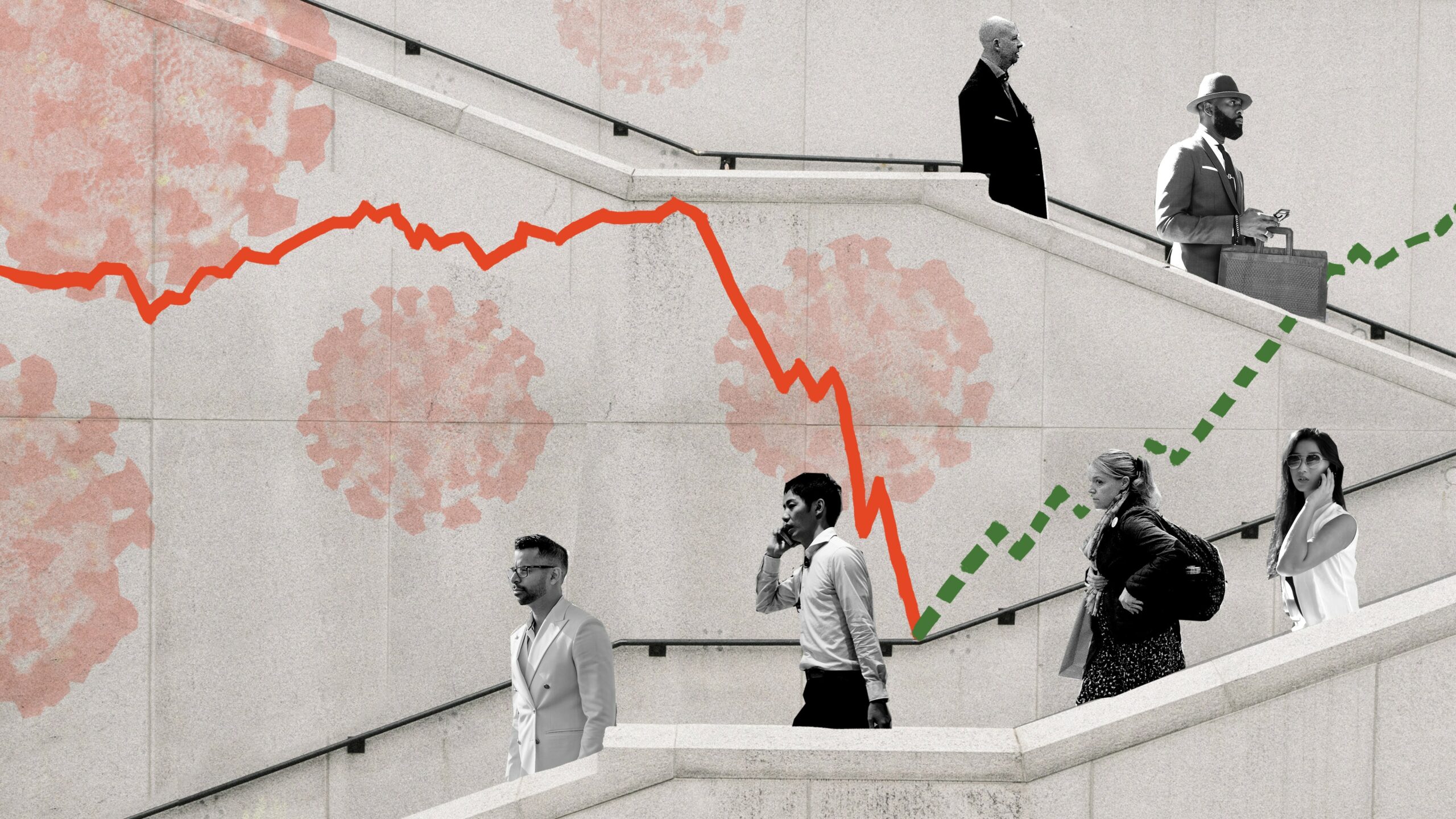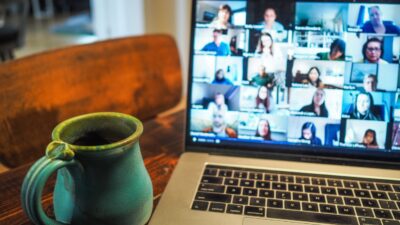Sandra Peter and Kai Riemer

Productivity on Corona Business Insights
Revisiting productivity and remote work: part two of a series looking at shifting working practices, distributed and hybrid work.
As COVID-19 sets out to change the world forever, join Sandra Peter and Kai Riemer as they think about what’s to come in the future of business.
Shownotes
Our previous discussions on working from home, Zoom fatigue, productivity and remote work and reorganising for hybrid work
The psychological benefits of commuting to work
Tips for improving productivity
World Economic Forum on work after COVID-19
How the world is returning (or not) to the office
51% of workers who returned to the office saw an increase in productivity
The problem with office-based practices
This episode is part of a podcast series covering what COVID-19 will mean for the business world, where we look at the impact on the economy, businesses, industries, workers and society. This is part of our ongoing coverage of the impact of COVID-19 on the future of business.
Follow the show on Apple Podcasts, Spotify, Overcast, Google Podcasts, Pocket Casts or wherever you get your podcasts. You can follow Sydney Business Insights on Flipboard, LinkedIn, Twitter and WeChat to keep updated with our latest insights.
Send us your news ideas to sbi@sydney.edu.au.
Dr Sandra Peter is the Director of Sydney Executive Plus and Associate Professor at the University of Sydney Business School. Her research and practice focuses on engaging with the future in productive ways, and the impact of emerging technologies on business and society.
Kai Riemer is Professor of Information Technology and Organisation, and Director of Sydney Executive Plus at the University of Sydney Business School. Kai's research interest is in Disruptive Technologies, Enterprise Social Media, Virtual Work, Collaborative Technologies and the Philosophy of Technology.
Share
We believe in open and honest access to knowledge.
We use a Creative Commons Attribution NoDerivatives licence for our articles and podcasts, so you can republish them for free, online or in print.
Transcript
Intro From The University of Sydney Business School, this is Sydney Business Insights.
Sandra And this is Corona Business Insights. I'm Sandra Peter.
Kai And I'm Kai Riemer.
Sandra And we're back unpacking the impact of COVID-19 on business, the economy, industry, government, workers and society, and looking at the effects of the pandemic while still in lockdown here in Sydney.
Kai And this podcast is part of a larger initiative by The University of Sydney Business School. And you can still find our COVID business impact dashboard online at sbi.sydney.edu.au/coronavirus.
Sandra And we're back taking a look at where the COVID-19 pandemic has left us on a range of topics. And today we're having another look at productivity. And this is part two of a series looking at changes in our work practices and the future of hybrid work.
Kai And in the next episodes, we will look at wellbeing and relationships and culture as we look at shifting work practices distributed and also hybrid work.
Sandra Before we get stuck into productivity might be worth saying a few words about how we thought about productivity right before COVID-19. Because obviously, things like working from home, flexible or remote work, were a thing before COVID-19. And we did actually have some good research on those practices before we went into the pandemic. And broadly all those studies suggested that working from home improved productivity.
Kai So there were a range of studies that suggested that those who are working from home improved their productivity by about 13%. And companies who would allow working from home could improve by as much as 22%, which is a day a week in extra productivity.
Sandra That amounts to a massive gain. So productivity was supposed to be improved by quite a bit by working from home.
Kai But of course, we need to take those surveys with a bit of a grain of salt because the people who work from home are largely those who elect to work from home because they can be more productive, and their work lends itself to working from home for productivity gains.
Sandra But research did show even back then that only about half the tasks that we do in the office could effectively be done from home. And we have to take into account here that there's many occupations and many types of work that cannot be done effectively from a home environment. So while largely studies showed that working from home improved productivity before the pandemic, right after COVID-19 hit, so middle of 2020, studies started coming out showing that broadly, productivity seemed to be negatively affected by working from home. So studies done last year in the UK, done by the Office of National Statistics showed that about 25% of people thought that their productivity had been negatively affected by working from home. For women, that number was much, much higher. Other studies that try to assess this in white collar work said that productivity decreased by about 7%.
Kai And I remember there was some disagreement about those numbers. While those studies showed that productivity took a hit. Many companies were quite pleased after a few months to say that their productivity hadn't actually dropped. And so we think it's worthwhile taking a look at what actually productivity is and where we measure it to make sense of some of those differences in how productivity is actually perceived.
Sandra So it's worth pointing out here that when organisations normally discuss productivity, they are talking about economic contribution about the overall output that a worker has in exchange for a salary that it draws from that company.
Kai But that is different when we look at the individual worker, because for the individual worker, it's about how much output do I create with the time that I invest into the work? So, how much in terms of my workload do I get done in a set amount of hours?
Sandra Even though the output that workers produced per hour might have fallen, given that we're working from home, many people have worked many extra hours to compensate for that reduction in productivity, overall giving the impression that productivity has either stayed the same or indeed has gone up.
Kai Which means actually, at the company level, productivity might have gone up, not because worker productivity was up, but because they worked longer hours. So for the same amount of money, the output might have gone up. But the equation at the worker level is negative, because if I work five hours a day, or I work 10 hours a day, those last five hours will not be as productive as the first five hours. So my productivity goes down as I work longer hours, even though in total, I might create more output. But that comes at a price, the price of work-life balance and wellbeing for example.
Sandra Many studies actually seem to all point towards this. We've seen in the UK a number of studies that say that the reduced amount of commuting time, about a third of that is now spent working. So additional time worked. In the US, studies out of Harvard and out of NYU last year, both showed that there was about an 8% rise in working hours, people on average worked almost an extra hour every day.
Kai And there was actually studies that showed that the situation in some sectors might have been even worse, as high as 30% longer hours, at least at the beginning of the pandemic as people had to figure out how to go about their work and how to get organised in what, for many, was a completely novel situation.
Sandra So what then are the problems that lead to this loss in productivity when people have to work from home?
Kai Well, mathematically, to begin with, one is longer hours, right? As we increase the input, output on longer hours drops, so that is one factor as we get less and less productive as we work longer and longer hours, as we struggle to separate work from home-life, especially those who live alone, have no incentive to actually stop work and sit down and do something else, as you are in lockdown anyway.
Sandra Or indeed, quite the opposite. The loss in flexibility working from home has always seen as the flexible option. But right now as we're all in lockdown in Sydney, many people with children have home-schooling responsibilities, do not have the ability to manage the time in the way they would want to. There's also added responsibilities of making your own lunch, making your own coffees, and of course, there are distractions, Netflix, Disney, Prime, Stan, Hulu...
Kai The fridge.
Sandra The fridge.
Kai Yeah, and then there's the general sense of crisis. Some people experience financial stress, mortgage stress, health issues, the inability to visit friends, family, relatives. All that adds to the mental load that we experience as we work from home which can negatively impact our productivity.
Sandra And strangely, even the loss of commuting seems to negatively impact our productivity. Most people dreaded the commute before the pandemic, it was seen as a big time waster, time spent commuting had gone up in previous years, people saw it as a waste of time. Even though we knew that the ideal commute wasn't zero, most people commuted longer than the ideal 16 to 25 minutes a day.
Kai And actually, it's been shown that for a long time, commuting times have always sort of oscillated in that space, 15 to 30 minutes, and as transport has improved, people will move further and further away from the centre, pretty much keeping that commute time steady.
Sandra But people, instead of being liberated from having to commute on densely packed trains, or subways or buses, or in never-ending traffic, it seems that after all the commute had some positive utility.
Kai And that is to separate the realm of work from the private life, to be literally a barrier, a transition from one context into the other, putting ourselves into a different mindset, assuming a different role, winding down from difficult work conversations, or on the way to work making plans in our head for how we're going to structure and go about our work, which incidentally would make us more productive during the day. And that now has gone as we just transition from the breakfast table to the couch to the work.
Sandra More than anything it signified that clear demarcation between the place where we live and the place where we work. And that's gone all together. A few people, and we'll include links in the shownotes, have actually developed some tricks to account for the commute, things like developing certain rituals to replace that commute and to mark the beginning of a work day, like variations or stretches or...
Kai Putting on a different set of clothes like you know, putting on a nice shirt or a blazer
Sandra Or any clothes.
Kai Exactly.
Sandra So they're all little things that we can do to try to improve productivity, as are things like creating a structure for the work day or you know if you're a manager setting some clear expectations as to how people will communicate, staying connected to other people as you would do if you were in an office environment.
Kai And we shouldn't forget that some of the productivity loss comes from the overhead in working itself, like the added communication that is needed in coordinating with others, where previously we could just shout across the desk, now we have to actually write a message and wait for a reply. So getting organised, finding those routines by which teams can update each other and create that awareness for the work process is also something that can be learned as we get used to using the kinds of collaborative technologies that have become so popular since we all transitioned into the home.
Sandra So the question now is, where to next? Hopefully, at some point, we're getting out of this lockdown. In many places around the world, people have gone out of lockdown, and are going back to work, likely to some form of hybrid work. So, where next for productivity?
Kai So interestingly, before the pandemic, working from home was associated with an increase in productivity, and now we're seeing initial results of surveys come out of people going back to the office who report that their productivity is actually increasing now that they're back. So, a report by Raydiant, and we'll put the link in the shownotes, shows that 51% of workers who have returned to the office saw an increase in their productivity.
Sandra That is if people have managed to return to the office, because...
Kai Because we're not!
Sandra Because many around the world have not yet managed. A World Economic Forum survey showed that globally a quarter of people want to go back and work in the office even five days a week, as soon as the pandemic is over, have not managed to do so yet. More than a third of people in places like the US or South Africa, India also want to return to work five days a week, but that has not yet been possible. Even in places like Singapore, or New York or London, more than half of people have not been able to return to the office yet.
Kai And so the interesting bit here is that before the pandemic work from home was the different thing that gave us more productivity over the normal way of working. Now that we're all coming back from working from home fully, the office is giving us more productivity over doing everything from home, which logically points to the fact that there might be a place for both locations in our work process, and that what we really need to think about is what is the best mix of working from home and working in the office for increased productivity?
Sandra While the pandemic kind of normalised remote working, we need to rethink what we define as work and where work takes place. Because we're still talking about returning to the office as if that is the normal and this is outside of the norm, even though the pandemic has normalised remote work as a way to work.
Kai And also you point to another interesting fact that work is not just the kind of tasks that I measure, you know, how many items do I shuffle away from my inbox or my in tray. But that work is actually more holistic, is a social endeavour, that is more than just the task work.
Sandra But finding the right mix for hybrid work, a combination of remote work and work in a central office is not just a matter of productivity. It's also, as you've said, a matter of connecting, of socialising, of building an organisational culture, building relationships, as it is a matter of wellbeing. All topics that we'll look at in the next two episodes, exploring changes in our work practices and the future of hybrid work.
Kai So we will leave it here. We'll pick it up next time.
Sandra But that's all we have time for today.
Kai Thanks for listening.
Sandra Thanks for listening.
Outro From The University of Sydney Business School. This was Corona Business Insights, the podcast that explores the future of business in the wake of the global pandemic.
Sandra Connect with us on LinkedIn, Twitter, WeChat and Flipboard. And subscribe, like or leave us a rating wherever you get your podcasts.
Close transcript













